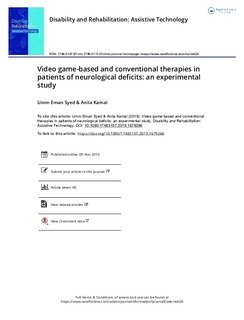Video game-based and conventional therapies in patients of neurological deficits: an experimental study
Journal article

Åpne
Permanent lenke
http://hdl.handle.net/11250/2635508Utgivelsesdato
2019Metadata
Vis full innførselOriginalversjon
Syed, U. E., & Kamal, A. (2019). Video game-based and conventional therapies in patients of neurological deficits: an experimental study. Disability and Rehabilitation: Assistive Technology, 1-8. https://doi.org/10.1080/17483107.2019.1679266Sammendrag
Purpose: In the past few years, medicine has upgraded its therapeutic techniques and practices, with the use of various modern methods that are due to advancement in technology and sciences. It is recognized that the physical health of the patients is significantly associated to their mental state, their motivation and engagement in overcoming the illness. This paper presents experimental comparison between virtual reality (VR) technology and conventional mode of therapy for physical rehabilitation among patients of neurological deficits. The objective was to explore the effectiveness of VR during physical interactions with different game-like virtual environment and potentially leading to increased mental health (i.e., lower depression, anxiety and stress), self-esteem, social support and intrinsic motivation (task-based competence, choice and interest).
Method: The study sample consisted of thirty-four subjects with Cerebral palsy (CP), Traumatic brain injury (TBI), Spinal cord injury, Stroke and Parkinson’s disease; divided into two experimental groups virtual reality exercise group (n = 17), and conventional therapy group (n = 17); who have upper- or lower-limb impairment.
Results: The outcome measures revealed significant differences across pretest and post-test conditions of both the experimental groups. Findings emerged from the study showed noticeable effectiveness of virtual-reality based rehabilitation in TBI, stroke and CP patients. Relationships between study variables and demographic variables (age and gender) were also presented.
Conclusion: This study opens the way for future researchers, psychologists, physiotherapist and other practitioners to do more extensive work in the domain of virtual reality with different sample, constructs and approaches.
Implications for rehabilitation
It has become increasing important to introduce new state-to-art technologies in domain of rehabilitation.
People are reluctant to use all the traditional modes of treatment. As these conventional ways of treatment are least motivating and interesting to indulge the patients without force and burden. It is evident in the present study that addition of virtual reality-based exercise increases the self-motivated balance during functional task in contrast to conventional and task-dependent training participants.
This study opens the way for future researchers to do more extensive work in this domain.